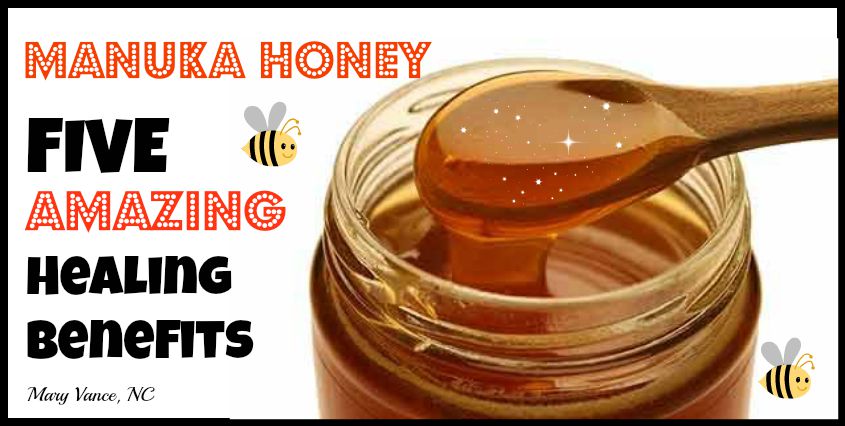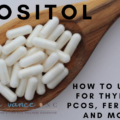Honey, the sweet and sticky stuff made of the nectar collected from flowers, has been renowned for its medicinal properties since the Ancient Egyptian era. Raw, unfiltered honey is an amazing source of enzymes and minerals, and it’s naturally antibacterial, making it an excellent wound dressing. Honey has humectant (attracts moisture) properties, so it’s great for skin and hair. Manuka honey in particular surpasses other types of honey for its healing properties.
Manuka honey, produced in New Zealand by bees that pollinate the manuka bush (also known as tea tree), outshines regular honey in its nutrient profile and ability to heal. It has a richer color and flavor over other types of honey and is higher in nutrients and enzymes. You may recognize tea tree for its microbial oil that helps treat acne and scalp conditions.
The one test that authenticates honey is the presence of pollen. If honey doesn’t contain pollen, it’s not true honey. Reports have shown that over 76 percent of the honey you buy at the grocery store may be adulterated or cut with corn syrup. Always buy your honey locally from a small farm, farmers’ market, or a co-op to ensure its purity.
Manuka honey even has its own grading system, the Unique Manuka Factor (UMF), to ensure the purity and quality of the honey. The UMF is a guarantee that the honey is unadulterated and medicinal quality. When purchasing manuka honey, look for a UMF anywhere between 10-15, which ensures superior antibacterial properties. This range is effective against resistant bacteria and possesses exceptional healing properties. I use this one.
Clinical trials have found manuka honey can effectively eradicate more than 250 strains of bacteria, including resistant varieties such as MRSA (methicillin resistant Staphylococcus aureus, MSSA (methicillin sensitive Staphylococcus aureus, and VRE (vancomycin-resistant enterococci).
What are the best ways to use manuka honey for health and healing?
5 Healing Benefits of Manuka Honey
1. Wound Healing: An enzyme called glucose oxidase is what gives manuka honey its antibacterial properties and sets it apart from other types of honey. The worker bees excrete the enzyme into the nectar, and the glucose oxidase releases low levels of hydrogen peroxide when the honey makes contact with a wound. When applied, manuka honey suppresses the growth of microorganisms. Studies show that manuka honey prevents infection, speeds wound healing, and reduces swelling and scarring by encouraging new tissue growth. Great for burns, too.
I have my own testimonial for manuka honey’s amazing healing properties. As you see in the pic below, I fell pretty much directly on my face and sustained some pretty hard core lacerations all up and down the right side. Look how pathetic and swollen I look the day it happened.
I applied manuka honey several times daily, and here is what the wounds looked like just 4 days later.
Here’s my face today– absolutely NO evidence of any injury. And the best part? The wounds were completely unnoticeable after a week. 7 days. I always use manuka honey for wound healing, to prevent scarring, and to heal burns these days.
2. Acne & Eczema: manuka honey’s antibacterial properties make it an excellent healing treatment for acne. If I get a zit, I use it as a spot treatment. It’s incredibly soothing and can be used to calm eczema flares. I also apply it in a thin layer on my face and let it sit for 10 minutes once a week to cleanse and moisturize my skin and to keep it clear. You don’t need to wash your face afterwards– you can just rinse and go. Your skin will feel soft and dewy.
3. Allergies: anecdotal evidence suggests honey may be beneficial for allergy sufferers. The thinking is that ingesting small amounts of pollen via honey will stimulate your body’s anti-histamine defenses. Use manuka honey along with my allergy busting turmeric tonic for excellent allergy relief.
4. Cough Suppressant & Immune health: we all know how soothing lemon and honey tea can be on a sore throat. Honey is also a natural cough suppressant. Studies show it’s more effective than cough syrup! Data published in the Journal of Leukocyte Biology stated that manuka honey stimulates immune cells. The turmeric tonic I mention above is a great immune tonic along with manuka honey, or simple hot water with lemon and manuka honey is great for kicking a cold and sore throat.
5. H pylori, IBD, and IBD: studies show that manuka honey kills the h pylori bacteria, the nasty pathogenic bacteria than causes ulcers and reflux. Though it needs to be combined with an herbal program utilizing mastic gum, it can shorten the duration of the kill phase in the h pylori eradication protocol. Manuka honey also has potent anti-inflammatory properties and supports intestinal healing, making it effective alongside a leaky gut healing protocol for IBS and IBD.
Manuka honey is a tasty way to improve your skin and your insides, too. Research is showing that honey may have a beneficial impact on blood glucose levels and may reduce inflammatory markers and cholesterol levels (source). Aside from wound healing, add some manuka honey to your tea and slather it on your face!
Have you tried manuka honey?
Pin it!

Mary Vance is a Certified Nutrition Consultant and author specializing in digestive health. She combines a science-based approach with natural therapies to rebalance the body. In addition to her 1:1 coaching, she offers courses to help you heal your gut and improve your health. Mary lives in San Francisco and Lake Tahoe in Northern California. Read more about her coaching practice here and her background here.












Thanks for posting this information:)
Honey golden liquid which is used a natural cure for health issue. I am using honey as medicine for cough, to reduce fat on body and face care.
I have recently started a site, the information you provide on this web site has helped me tremendously.
Thanks for all of your time & work
Wow, I want to try this since I have a compromised immune system.